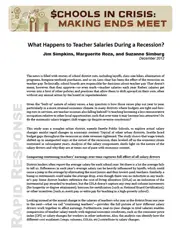For school districts, the recession has meant layoffs, class size hikes, elimination of programs, foregone textbook purchases, and more. Less clear has been the effect of the recession on teacher pay. While school boards are responsible for decisions about teacher pay, that doesn’t mean that they approve—or even track—teacher salaries each year. Rather, salaries get woven into a host of other policies and practices that allow them to drift upward on their own, often without any annual action by the board or superintendent.
In many districts where budgets are tight and forcing cuts in services, are teacher incomes also falling behind? Or, do the automatic salary triggers shift wages up despite revenue constraints?
This study uses data from Seattle Public Schools to explore actual salary changes amidst rapid changes in economic context. Typical of other urban districts, Seattle faced budget gaps throughout the recession as state revenues tightened. The study shows that wage trends shifted up in unexpected ways at the outset of the recession, then leveled off as the economic strain continued in subsequent years. Analysis of the salary components sheds light on the nature of the salary drivers and why they are at times out of pace with economic context.
By giving up control over salary decisions, school district leaders surrender one of the biggest cost determinants for which they are ultimately responsible. A system that allows some costs to increase while revenues are constrained by economic context is a system designed to require painful cuts during a downturn.





